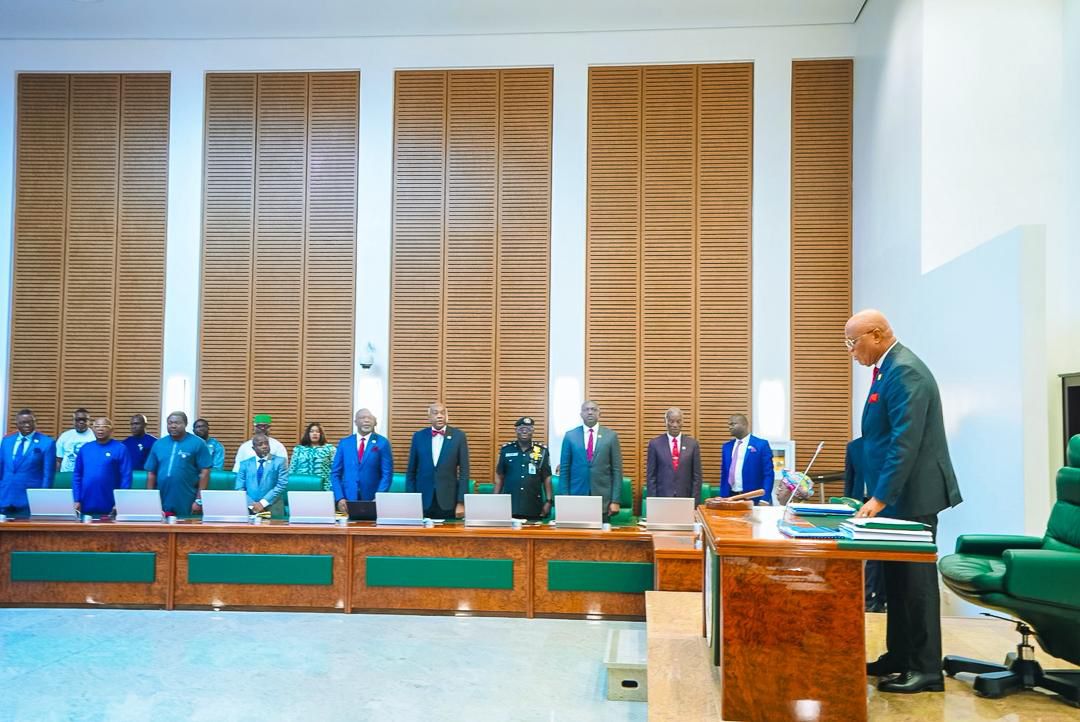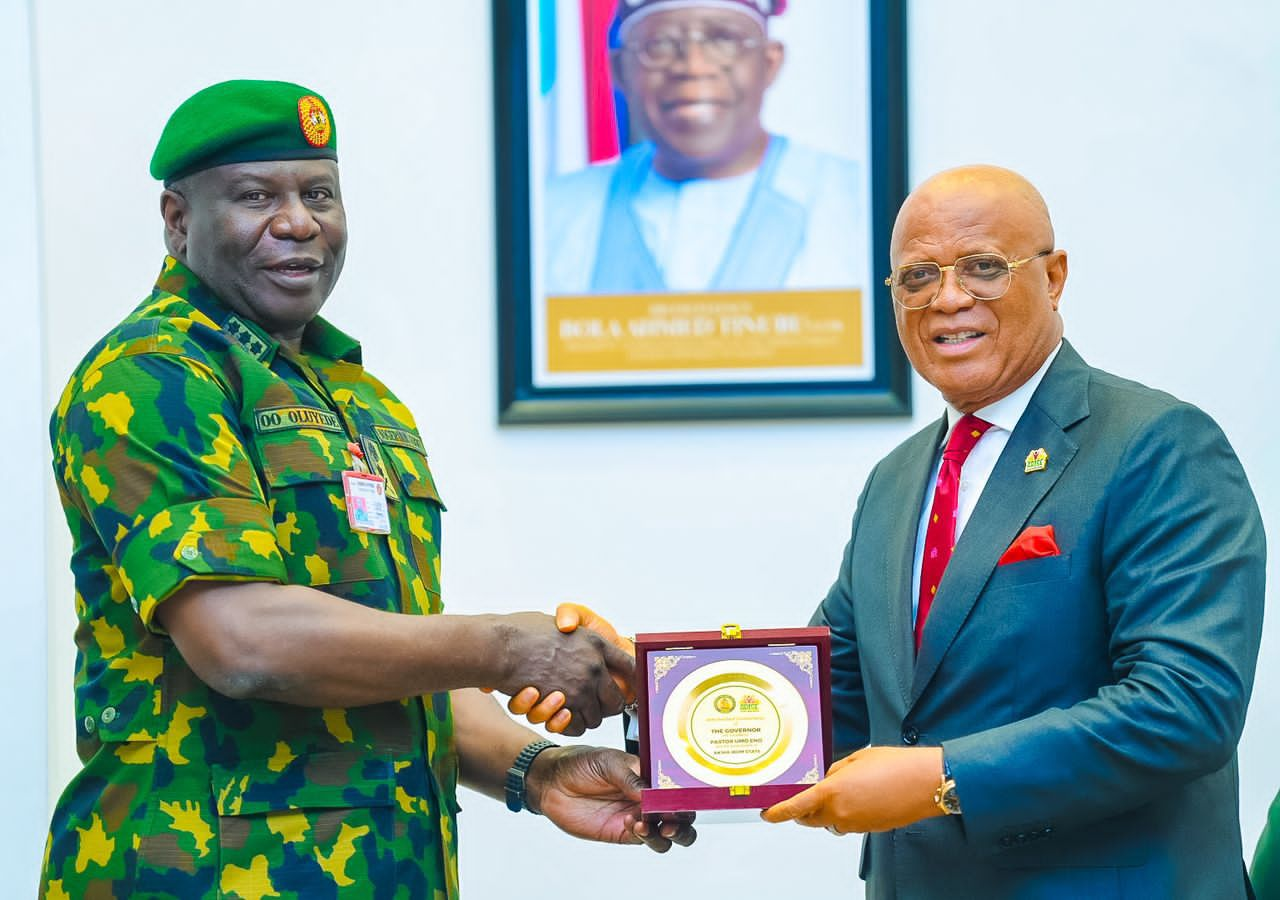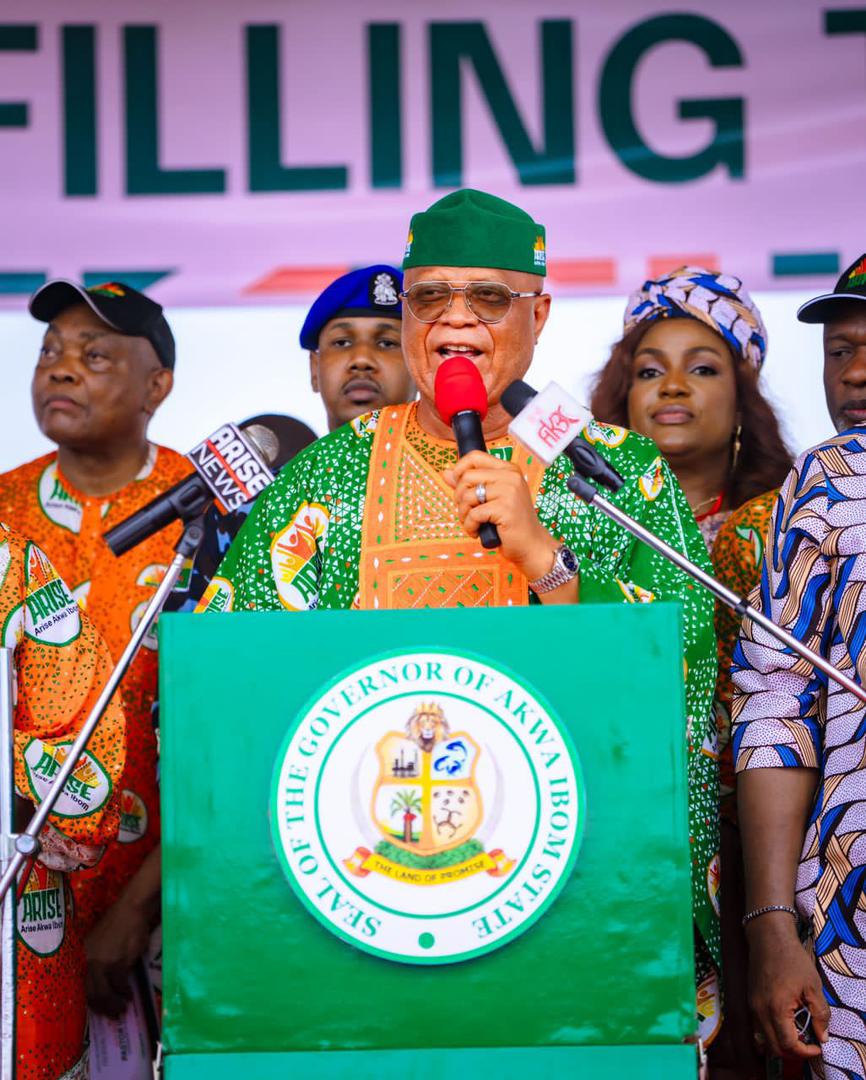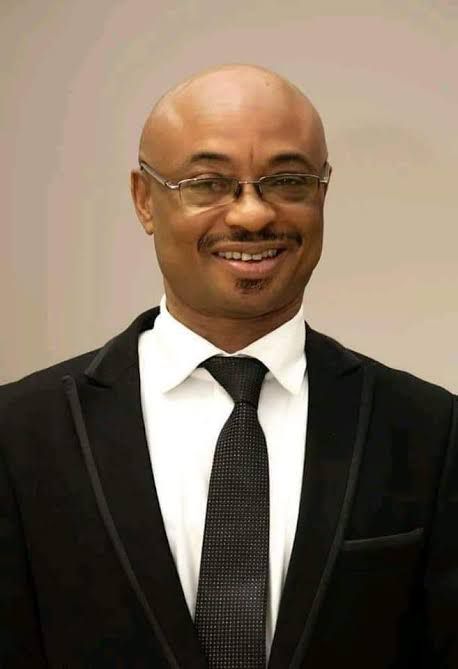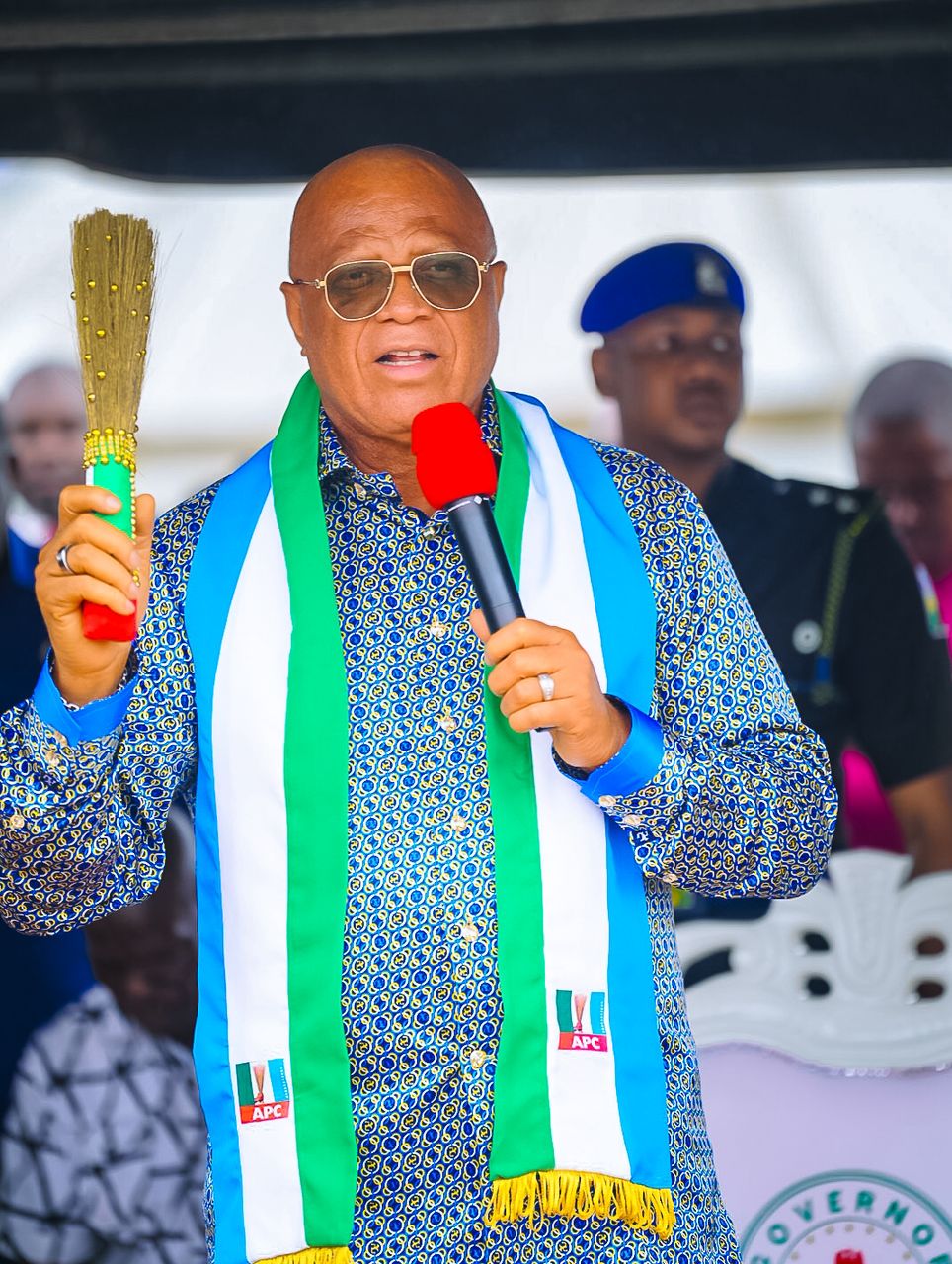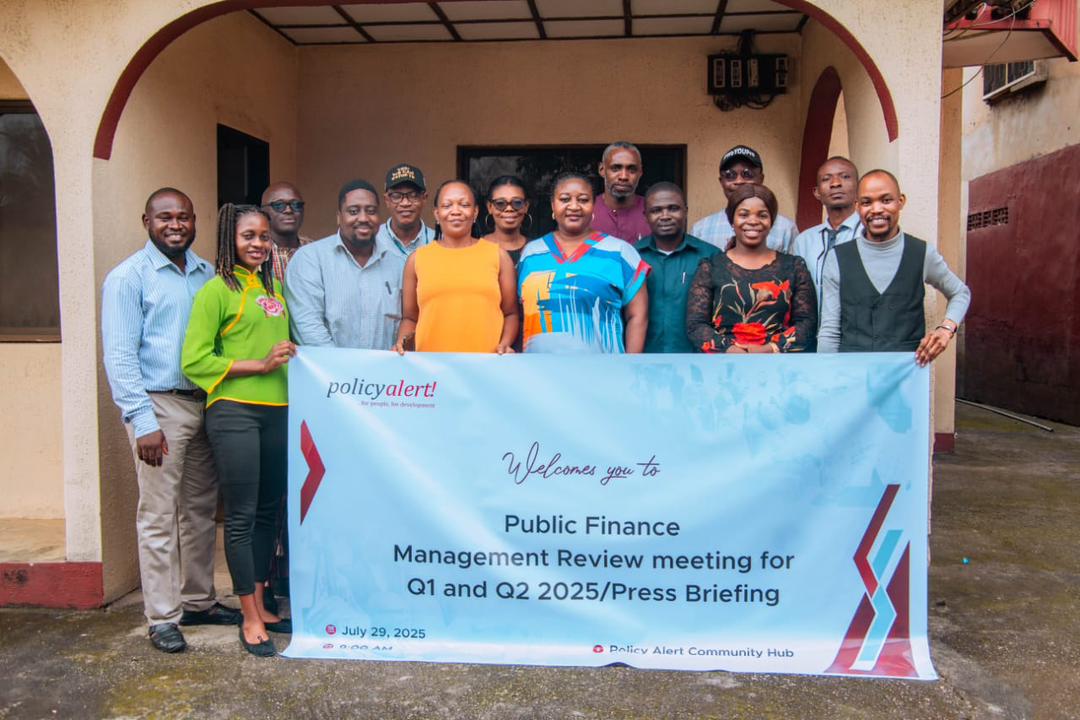GOV ENO INAUGURATES COMMITTEE TO COMBAT ILLEGAL MINING IN AKWA IBOM Akwa Ibom State Governor, Pastor Umo Eno, has inaugurated a committee to combat illegal mining across the State with the Commissioner for Environment and Mineral Resources, as Chairman. The Governor inaugurated the Committee, August 19, 2025, at the Executive Council Chambers, Government House, Uyo, shortly before a meeting of the State Executive Council. The Governor who frowned at the rise of illegal mining activities in the State particularly across the coastlines, said there was need for the committee to check the ugly trend. He noted that the composition of the committee was large, and all encompassing, to ensure effective delivery. “The Ministry of Environment cannot do this alone. They need the collaboration of all of us, and we need to back it up with a law. “If we do not checkmate this menace, there could be an influx of people that could be security threats to our State. That’s why we are taking it very serious. We want to know who are the miners in this State, what is their profile, what type of minerals are they mining and who do they pay tax to? “Let me sound a note of warning. If we find anyone illegally involved in encouraging illegal mining in our State, we would severely deal with the person accordingly. Local Government Chairmen, take charge of your respective areas. You are the Chief Executive Officers of the local governments. So, please do not tolerate any illegality, bring it up early to our attention, and let us address it,” he said. Governor Eno made reference to an ugly situation in Ibeno where land sold to a company was used as dump site for some hazardous waste, and directed the Commissioner for Lands to investigate and revoke all land procured by oil and gas servicing companies without government approval. He urged the committee to hit the ground running and ensure that it presents a monthly report. Members of the committee include the State Commissioners for Special Duties, Transport, Internal Security, Attorney General/Commissioner for Justice, Commissioner of Police, Honorary Special Adviser on Security, Chairman of Association of Local Governments of Nigeria (ALGON), and Local Government Chairmen of the coastal areas.
GOV ENO TO SUPPORT NIGERIAN ARMY ON PROJECT INTERVENTIONS AT IBAGWA BARRACKS
GOV ENO TO SUPPORT NIGERIAN ARMY ON PROJECT INTERVENTIONS AT IBAGWA BARRACKS … requests operations base in Oron In furtherance of his administration’s commitment to deepening collaboration with the Nigerian Army, Akwa Ibom State Governor, Pastor Umo Eno, has assured that the State will undertake some projects interventions at the Wellington Bassey Barracks of Nigeria Army’s 6 Battalion in Ibagwa, Abak Local Government Area. He said the intervention is to ensure good accommodation for personnel in the State and to motivate them to continue in doing their work properly. The Governor stated these when he received in audience the Chief of Army Staff and his team who had paid him a courtesy call at the Executive Council Chambers, Government House, Uyo. “We have noted the need for us to intervene at the Ibagwa baracks.The Commissioner for Internal Security will pay a visit to see the areas we can intervene in, so that we can continue to have good accomodation for our people,” he said. He noted that the State has already supported some project interventions at the 2 Brigade cantonment located in Mbiokporo, Nsit Ibom Local Government Area, and assured of continuous support to the Army and other security agencies in the State. Governor Eno implored the Army authorities to establish an army operations outpost to beef up security in the coastal area of Oron and the environs. “Arising from our reminders, you have graciously agreed to grant us a military operations outpost at Oron coastal areas. We critically need this intervention to beef up security in that axis. “So, we strongly believe that having the military operations unit there would considerably help reinforce our security arrangements in the State,” he noted. Governor Eno appreciated the Army for collaborating and synergizing with other security agencies which, according to him, has resulted in the peace and security enjoyed in the State. “We want to really appreciate the Nigerian Army for the laudable work they do, particularly for the collaboration that exists between the Nigerian Army in Akwa Ibom State under the leadership of the Commander, 2 Brigade, Brigadier General Alexander Tawasimi, and our State,” he said. Earlier, Lt Gen Oluyede said he was in Akwa Ibom State on an operational visit to units and formations under the Army’s 6 Division, and decided to pay homage to the Governor and people of the State. He appreciated the Governor Umo Eno – led administration for all its support to the Army in the State, adding that he knows the Governor personally and was not surprised by his kind disposition towards security agencies in the State. The Army Chief said the support received by security agencies is evident in the peace and security experienced across the State, and reaffirmed that Akwa Ibom remains one of the most peaceful states in the Nigeria. Lt. Gen. Oluyede was accompanied on the visit by the General Officer Commanding 6 Division, Major General Emmanuel Emekah; Chief of Operations, Major General Uwem Bassey; Chief of Logistics, Major General Akerejola Adeyinka, Chief of Account and Budget, Major General Adetokunbo Fayemibo; Provost Marshall, Major General Garba; Chief of Military Intelligence, Major General TB Ugiagbe, Commander 2 Brigade, Brig.Gen. Alexander Tawasimi, Commander 63 Brigade, Brig. Gen. Folu Shonibare and others. On hand to receive the Chief of Army Staff and his entourage were the Deputy Governor, Senator Akon Eyakenyi; Secretary to the State Government, Prince Enobong Uwah; and other members of the State Executive Council.
Uyo Town Square Meeting: Governor Eno Doles Out N492.7m Farm/Trade Grants Idongesit Ashameri, Uyo
Uyo Town Square Meeting: Governor Eno Doles Out N492.7m Farm/Trade Grants Idongesit Ashameri, Uyo Akwa Ibom State Governor, Pastor Umo Eno, has doled out the sum of N492.7m as empowerment to 1187 persons as farm, trade, and business development grants in Uyo Federal Constituency. The Governor disbursed the grants during the Uyo Federal Constituency Town Square Meeting held at the Ibom Hall grounds, Uyo at the weekend. Addressing the crowd of both beneficiaries and supporters, the Governor said 276 constituents were successfully selected to benefit from the ARISE Farmers grant, 628 for the ARISE Traders grant, 263 for the ARISE Equipment support scheme, while eight persons benefited from the N5 million MSME grant, and 12 got cars and mini buses. Governor Eno said within the two years of his administration, 116 projects, including roads, health centres, compassionate homes, elderly home, and primary schools have been executed across the Federal Constituency which comprises Uyo, Uruan, Nsit Attai and Ibesikpo Asutan LGAs. He said the meeting was to receive the Needs document of the Constituency in order to include them in the 2026 Peoples’ budget, and to give grants to the constituents, as would be done in all other federal constituencies. The Governor said the selection process was powered from the ARISE Youth Employment portal and that the beneficiaries were qualified citizens of the Federal Constituency. Governor Eno who appreciated the people of Uyo for the massive turn out, said it was indicative of their status as the landlords of Government House, and also appreciated the Secretary to the State Government, Prince Enobong Uwah for leading his people to unite with the centre, assuring everyone of more development projects. The State Chief Executive said he received the needs document from the people of Uyo with an open heart, and promised to treat it accordingly, based on availability of funds. Governor Eno appreciated the President Bola Ahmed Tinubu-led federal administration for making funds available to States, which, according to him, has made it possible to execute the empowerment scheme, the entrepreneurship support and different development projects. He directed the Ibom Leadership and Entrepreneurial Development Center (Ibom LED) to commence the process of training another 50 persons each from all the recognised female and male support groups, for another set of empowerment. The Governor also announced the federal government-funded ward development empowerment initiative for 100O persons per ward, and urged the people to return to their respective wards to ensure that entrepreneurs at their respective wards partake in the programme. He called on the people to support the President for a second term in 2027 as well as other APC candidates in the 2027 elections, to further the synergy with him, having enjoyed an overwhelming endorsement as sole candidate for Governorship in the 2027 elections. Governor Eno who has since inception of his administration remained committed to celebrating Akwa Ibomites who are making impacts in their different careers across the world, also took out time to celebrate a daughter of Uyo Federal Constituency, Uduak Otu Ita, Deputy Commandant, Nigeria Police College, Oji River, Enugu, who was recently promoted to the rank of Commissioner in the Nigerian Police Force, and presented her with a brand new SUV, saying that the stride was a source of encouragement and motivation especially for the girl child. He urged everyone to continue to remain united with a focus on the Akwa Ibom project, warning against insulting any leader irrespective of political affiliation, stressing that a united and progressive Akwa Ibom supercedes every other consideration. “We want to continue to ask you to remain united. Please don’t abuse anybody and when people abuse you, don’t answer them. We want to continue to build this state for our generation and generations unborn,” he said. Presenting the needs document, the Secretary to the State Government and political leader of Uyo, Prince Enobong Uwah, appreciated the Governor for the impactful development projects in the Federal Constituency, adding that they have been enjoying double of the projects executed in other federal constituencies, and assured of more support in the 2027 election. Earlier while setting the tone for the event, the Director General of campaigns, Ambassador Assam Assam, said having moved round the State with the Governor during the 2023 electioneering campaign, he was proud that the Governor has kept to his campaign promises. On their parts, the local government chairmen, Commissioners, House of Assembly members and Paramount Rulers from the Federal Constituency, as well as non indigenes, appreciated the Governor for all his impactful strides in their domain, and assured him of their continuous support. High point of the event was the unanimous adoption of the Governor as the sole Governorship candidate for Uyo Federal Constituency in the 2027 election following a motion moved and seconded by Rt. Hon. Mark Esset, and Hon. Ubong Attah respectively.
AKSU Appoints Prof Akpan Acting Vice Chancellor
AKSU Appoints Prof Akpan Acting Vice Chancellor The Governing Council of Akwa Ibom State University (AKSU) has confirmed the appointment Of Professor Otoabasi Akpan as acting Vice Chancellor of the institution. Akpan who is a professor of Biochemistry was confirmed during the 40th meeting of the Governing Council held at the main campus in Ikot Akpaden, Mkpat Enin Local Government Area. The council reached the decision in accordance with the institution’s regulations, pending the appointment of a substantive Vice Chancellor. Akpan, whose career spans decades of academic excellence, leadership, and research, both within AKSU and in broader academic circles, prior to his new role held the position of Deputy Vice Chancellor (Administration). A brief profile of the new VC made available to our correspondent indicates that Prof Akpan previously served as Dean, Faculty of Natural and Applied Sciences, where he led reforms that improved academic output and research development. He has chaired numerous university-wide committees, including the Senate Curriculum Committee and the Academic Planning Committee. Earlier in his career at AKSU, Professor Akpan served as Head of the Department of Biochemistry, a member of the University Senate, and Director of the Centre for Research and Innovation. His extensive experience within the institution has positioned him as a respected figure among faculty and students. Beyond AKSU, Professor Akpan is recognized for his contributions to scientific research and development. He has authored and co-authored several peer-reviewed publications and maintains active membership in professional associations such as the Nigerian Society of Biochemistry and Molecular Biology (NSBMB). In his acceptance remarks, the Acting Vice Chancellor expressed appreciation to the Governing Council for the opportunity to serve. He pledged to maintain stability and uphold the academic values of the university. “This is a collective responsibility, and I will rely on the cooperation of every stakeholder to keep the university on its path of growth,” he said. He also pledged to prioritize student welfare, staff development and academic integrity during his time in office. According to him, the immediate focus will be on continuity, institutional efficiency, and strategic planning. Professor Akpan takes over from Professor Nse Essien, whose five-year tenure ended in line with the university’s statutes. The outgoing Vice Chancellor is credited with spearheading major infrastructural projects and enhancing the institution’s visibility nationally and internationally.
Benue Records 156 Suspected Lassa Fever Cases, 6 Deaths
Benue Records 156 Suspected Lassa Fever Cases, 6 Deaths Benue State has recorded 156 suspected cases of Lassa Fever, with 15 confirmed cases and six deaths from those confirmed cases. Additionally, there have been nine probable deaths linked to the disease in the past six months, according to Dr. Msuega Asema, the State Epidemiologist. The seven Local Government Areas affected by the suspected cases are Ukum, Makurdi, Guma, Okpokwu, Vandeikya, Gwer-West, and Otukpo. Dr. Asema emphasized the need for prevention, early detection, and treatment, highlighting measures like covering food and washing hands to prevent infections. Meanwhile the World Health Organization (WHO) has advocated for a shift from reactive to proactive measures in tackling Lassa Fever in Benue. Dr. Mohammed Abdulkarim, WHO State Coordinator, stressed the need for attitudinal change in health practices to prevent infections.
Gunshot Death in Church, Akwa Ibom Police Launch Murder Investigation
Gunshot Death in Church, Akwa Ibom Police Launch Murder Investigation On August 5, 2025, a tragic incident occurred in Ikot Oku Usung village, Ukanafun Local Government Area of Akwa Ibom State. A 45-year-old man, Mr. Udeme Sunday Uko, was found dead with a gunshot wound to the head inside a church where he was sleeping with his wife and children. According to a release signed by the Police Public Relations Officer, Akwa Ibom State Command, DSP Timfon John and made available to Newsmen in Uyo on Wednesday, the incident occurred at approximately 12:10 a.m. A gunshot was heard in the church, and Mr. Uko was later discovered in a pool of blood. “The Command was alerted to the incident by concerned citizens who received the report from the victim’s wife. “Upon receiving the information, a team of police officers was immediately dispatched to the scene of the crime. During the visit, a locally made pistol was recovered as an exhibit. The corpse of the deceased has since been deposited at the Mortuary for preservation and autopsy”. The report stated The release reports further that a locally made pistol was recovered from the scene as an exhibit, adding that the body of the deceased has been taken to a mortuary for preservation and autopsy. It hinted further that the Commissioner of Police, CP Baba Mohammed Azare, has directed a thorough and swift investigation into the circumstances surrounding the death. “Investigation is ongoing, and further developments will be communicated to the public as they arise,” the police statement read.
Akwa Ibom Governor Kicks Off APC Membership Registration
Akwa Ibom Governor Kicks Off APC Membership Registration Akwa Ibom State Governor, Pastor Umo Eno, has initiated the membership revalidation/registration exercise of the All Progressives Congress (APC) in the state. The Governor validated his membership at Ibiakpan Obotim Ward II in Nsit Ubium Local Government Area, securing registration number 001 in the party register. Addressing the people, Governor Eno called on all party faithful and intending members to register at their respective wards, maintaining that the exercise is necessary to validate and revalidate authentic members of the party. The registration exercise will last for one month, after which a new membership register will be recognized as the authentic working document of the party. The Governor expressed satisfaction with the smooth conduct of the exercise and charged party members to be patient and orderly during the registration process. He stated that the registration is a deliberate effort to support President Bola Ahmed Tinubu’s economic transformation agenda and Senate President Godswill Akpabio’s leadership. Governor Eno urged the people to work in unity, peace, and love for a united Akwa Ibom, emphasizing that a united people will always remain progressive. He encouraged party members to participate in the registration exercise and obtain their membership tickets. The party’s membership registration exercise at Ibiakpan Obotim Ward II witnessed a large turnout of members and would-be members, who were enthusiastic and excited to participate in the registration. The registration exercise is expected to formally identify party members and their stance, and the new membership register will serve as the authentic working document of the party.
Lafarge Africa Donates Modern Libraries to Host Communities in Cross River
Lafarge Africa Donates Modern Libraries to Host Communities in Cross River Lafarge Africa, a leading innovative and sustainable building solutions company and manufacturer of a range of cement brands, has officially inaugurated two newly equipped libraries for secondary schools in its Mfamosing host community in Cross River State. The handover of the library projects held simultaneously on July 17, 2025 at Obutong Comprehensive High School, Obutong community,and Government Secondary School, Akwa Ikot Effanga. In his remarks, Mr. Abiodun Akingbade, representing the Plant Manager, Mfamosing Plant, Milad Hanna reiterated the company’s commitment to educational advancement, youth development, and infrastructure improvement within its host communities and emphasised that the project aligns with the Cross River State government’s ongoing effort to strengthen educational infrastructure in local communities. “These library projects reflect our commitment to listening and responding to what really matters to our host communities. We embarked on these projects to provide access to tools that empower children located within these communities,”Hanna Delivering his remarks at the ceremony, the Director of Policy & Higher Education, Cross River State, Dr. Moses Agboreyo, representing the Commissioner for Education, Sen (Dr.) Stephen Odeycommended Lafarge Africa for its continued interventions in the education sector which has helped a great deal in complementing the government’s work in education. Agboreyo urged traditional institutions and other relevant authorities to ensure proper security and maintenance of the facilities to guarantee long-term benefit for students. Also speaking at the event in Obutong, Communications & Public Affairs Manager, Lafarge Africa Plc, Mr. Inyang Bassey explained that the initiative is part of the company’s broader corporate social responsibility efforts that is focused on creating shared value and sustainable futures. “We believe that knowledge is a cornerstone for building thriving communities. Through this project, Lafarge Africa is not only contributing to academic excellence but also reinforcing the value of community partnership. Every investment in education today is a step toward a more sustainable tomorrow,” Bassey noted.
CSOs Caution Akwa Ibom Government Over Breach of Fiscal Transparency Law
CSOs Caution Akwa Ibom Government Over Breach of Fiscal Transparency Law A non-governmental organization, Policy Alert, has criticized the Akwa Ibom State Government for its recent decline in fiscal transparency. The NGO reminded the State Government that its recent actions breached the Fiscal Responsibility Law, which mandates full, timely, and wide disclosure of public finances. Speaking at the Public Finance Management Review meeting for Q1 and Q2 2025/Press Briefing in Uyo, Tijah Bolton-Akpan, Executive Director, Policy Alert noted that this reduction in transparency marks a significant departure from previous standards and will limit the ability of civil society, media, and stakeholders to scrutinize fiscal activities in the state. Bolton-Akpan regretted that the state has reduced its Budget Implementation Report to a mere 3-page summary for the first and second quarters of 2025. “For Q1 and Q2 2025, the State has reduced its Budget Implementation Report to a 3-page summary instead of the usual comprehensive reports (averaging 46-pages) in preceding years,” “The current limited reporting falls short of these legal requirements, risking non-compliance and undermining public trust,” the report stated. The NGO noted that Akwa Ibom State has made steady progress in fiscal transparency and accountability over the years, including online publication of annual budgets and budget implementation reports. However, the recent rollback in financial transparency is against these gains. According to the report, key gaps in the current public finance management cycle include lack of detailed breakdown of revenue by Administrative Classification and lack of data on Revenue Sources. To restore and strengthen financial transparency, the CSOs called on the state government to reinstate comprehensive quarterly and annual Budget Implementation Reports and align with PFM-aligned legal frameworks. The CSOs also called on the state government to improve data accessibility by making financial reports available online in user-friendly formats and engaging civil society and media in data interpretation. “Government officials should publicly commit to transparency, and civil society must hold government accountable through advocacy and monitoring,” the report emphasized. The coalition of Civil Society Organizations which took turns to make inputs at the meeting expressed concern that the Akwa Ibom State’s lack of fiscal transparency is particularly concerning given that it is one of only a few states in Nigeria that has not published detailed capital expenditure reports since Q1 2025. Adding that states publish reports exceeding 60 pages, including project-level details in key sectors like Education and Health.
Chinese Nationals in EFCC Net Over Illegal Mining in Akwa Ibom
Chinese Nationals in EFCC Net Over Illegal Mining in Akwa Ibom Eleven suspects, including seven Chinese nationals have been arrested by the Economic and Financial Crimes Commission (EFCC), for alleged illegal mining of ilmenite in Akwa Ibom state. Dele Oyewale, EFCC Head, Media and Publicity, said Tuesday, that Operatives of the Uyo Zonal Directorate of the anti graft agency apprehended the suspects Thursday last week at Emem-Asuk, Eastern Obolo Local Government Area (LGA) of the State. “The Chinese suspects are Yang Chaobao, 32, Zhong Dun Yi , 33, Cheng Jiang , 35, Zhong Dun Long , 37, Pan Peiming , 33, Lai Yiping, 37 and Zhu Lekun, 35. “Their Nigerian accomplices are: David Israel, 18, Jonah Bartholomew Jim , 24, Samuel Samuel Timothy, 20, and a female translator named Comfort Gabriel Ajaga , 23”. He said “They are operating at Eastern Obolo area where they were arrested whilst setting up mining equipment at a second location. They were already engaged in the illegal activities at their first location, mining ilmenite, locally called black sand” The only female among the suspects said her only connection to the illegal miners was her proficiency in speaking ‘mandarin’, a widely spoken language in China. “I am a student studying Chinese language at a Learning Centre in Anambra State and I only work with them as a translator”, she said. “The suspects will be charged to court upon conclusion of investigation”, Oyewale further stated.
